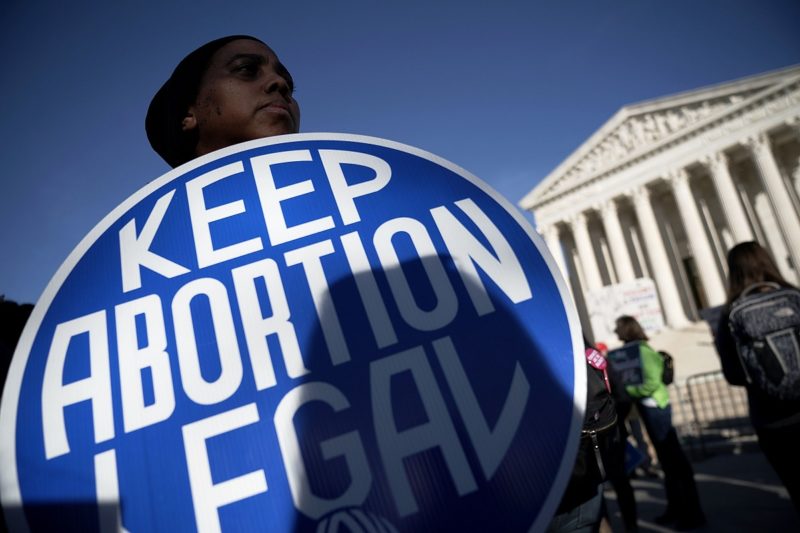States Are Racing to Overturn Roe. As State Legislators, We Are Fighting Back
We won’t stand idly by while opponents of legal abortion proudly announce their goals to criminalize abortion.

Since the start of 2018, our states—Iowa, South Carolina, and Mississippi—have progressed unconstitutional anti-choice legislation that aims to severely restrict abortion.
A bill to ban abortions after 15-weeks’ gestation recently passed the Mississippi legislature.
A bill to ban virtually all abortions advanced through the Iowa state senate.
And in South Carolina, two bills—one to effectively ban all abortions and another to ban dilation and evacuation abortions, a method frequently used during second-trimester procedures—advanced through state senate committees.
And it’s only March.
Make no mistake: Each of these bills is in direct conflict with the promises of Roe v. Wade, the U.S. Supreme Court decision that recognized 45 years ago that women have a constitutional right to make a decision to end a pregnancy. And that’s the point. Each of these bills are an attempt to become a law and be the one that faces a court challenge going all the way to the top.
It’s never been clearer that our fundamental reproductive rights are at risk. As legislators in three different states, each of which are unfortunately dealing with outrageous attempts to ban abortion, we are at the front lines of stopping a direct challenge to Roe, and we’re not backing down.
Every year, we battle against bills that seek to ban abortions, make it harder to access abortion care, and make women feel bad about the decisions they have made. In fact, more than 400 such bills have been enacted in states over the past seven years. The effort to eliminate abortion access began as conservatives grabbed power in statehouse after statehouse, and continues now at all levels of government, as the Trump administration continues its stealth attack on reproductive rights. Vice President Mike Pence, who decimated reproductive health-care access while serving as governor of Indiana, recently predicted that legal abortion could end in the United States within his lifetime.
It’s these statements that make it clear that even when states push legislation that on its surface seeks to limit or restrict abortion rights at different points in pregnancy, the real mission is to ban abortion entirely. This strategy of advancing a 20-week abortion ban or a 15-week ban or a six-week ban is about measuring public opinion, legislative appetite, and grassroots resistance—all in an effort to ultimately convince the Supreme Court to overturn 45 years of legal precedent and ban abortion completely.
In South Carolina, the so-called Personhood Act, which seeks to establish full legal rights including due process and equal protection for eggs from the moment of fertilization before a pregnancy has occurred, is advancing. The scope of this kind of bill is enormous, affecting everything from contraception and abortion to fertility treatments—and its passage could create a climate where a woman who suffers pregnancy-related complications or miscarriage might be viewed suspiciously and exposed to an extensive criminal investigation.
In Mississippi, home to just one abortion clinic, a ban on abortions at 15 weeks has passed the legislature. Make no mistake: Fifteen weeks is a completely arbitrary point in a pregnancy, and this attempt to ban abortion serves only as a political ploy to move the needle closer to an all-out criminalization of a critical reproductive health-care service that nearly one in four women will need in her lifetime. In a state with devastatingly poor outcomes on women’s and children’s health and where abortion is already heavily restricted, there is no justification for state legislators dedicating time to restricting abortion.
Meanwhile, in Iowa, a “heartbeat” bill approved by state senate Republicans would ban virtually all abortions and make criminals out of doctors who performed them. Besides the ban being unconstitutional, the University of Iowa could lose accreditation for the state’s only OB-GYN residency program, a highly successful program where one-third of the OB-GYN residency graduates remain in Iowa to practice. The state is already ranked next to last in the nation for OB-GYN physicians per capita, with two-thirds of Iowa counties lacking a single OB-GYN.
These are just three examples of the literally thousands of attempts to restrict abortion that have been proposed in every state over the past several years. But this is not something the American people want. Polling has found that most Americans support the legal right to abortion and don’t want to see Roe v. Wade overturned.
As state legislators, we are saying: Not on our watch. We won’t stand idly by while opponents of legal abortion proudly announce their goals to criminalize abortion. That’s why we are among the nearly 250 state legislators so far who have joined the Reproductive Freedom Leadership Council—and we’re reclaiming the mantle of public service to make sure we are working for the good of our constituents, including respecting their rights to control their own bodies.
State legislators are tasked with making decisions that affect the lives of our constituents. But we should not be making decisions about women and their pregnancies. We believe our laws should safeguard and respect women’s health, rights, and privacy, and their ability to make their own healthcare decisions.
Join us in working to put an end to political attacks on women’s rights and health.

